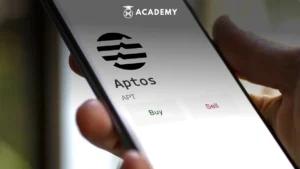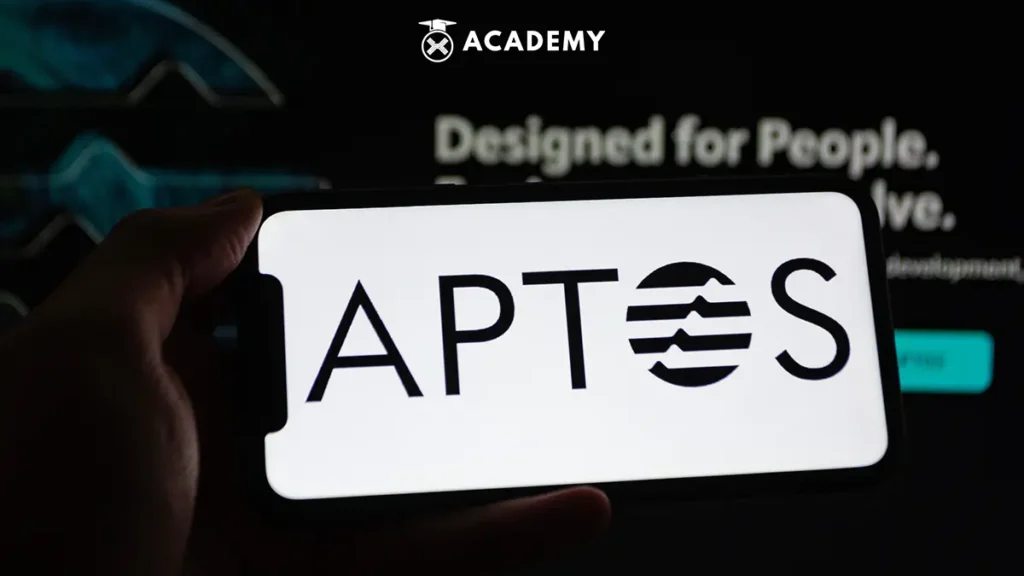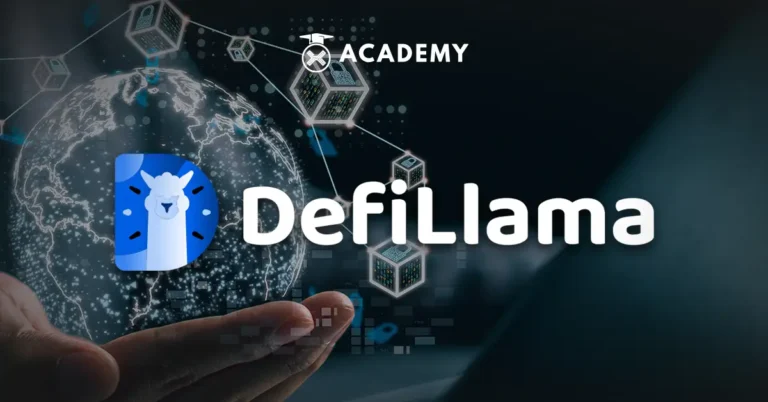In the cycle that occurs in the world of blockchain and crypto assets, various new projects continue to emerge at every stage. History also shows that most projects prefer to launch their products when the market is sluggish (bear market). However, these projects often receive widespread attention when the bull market phase returns.
At the end of 2022, Aptos appeared as a new blockchain project that began to attract attention since its launch. Since then, there has been a lot of talk about Aptos and its potential. This layer-1 blockchain achieved significant achievements in the crypto world by raising around $200,000,000 in a seed round initiated by Andreessen Horowitz, a well-known venture capital firm.
So, in this article, we will learn more about Aptos (APT), who is behind its creation, how it works, APT tokenomics, and its applications and ecosystem. Check out the full review below.
What is Aptos?

Aptos is blockchain layer-1 designed with high scalability and is modular (standardized), allowing customization per user or client requirements. These two features make Aptos a blockchain platform that can be used in various cases related to crypto and Web3.
As a modular blockchain, Aptos allows each component to be changed, replaced, and updated independently without disrupting the operation of the entire network. Some examples of modular blockchains include Cosmos, Ethereum, and Polkadot. In its white paper, Aptos emphasizes that the basic principles of its blockchain are “scalability, safety, reliability, and upgradeability.” In addition, Aptos uses a proof-of-stake (PoS) network system with a token called APT.
Aptos adopted virtual machine technology called Move, which was originally developed for Facebook’s blockchain project (Meta), although the project was later canceled. Move is a Rust-inspired programming language used by NEAR, Polkadot, and Solana. Move VM itself is expected to compete with Ethereum VM and other platforms. Aptos stated that Move has various advantages that make it easier for developers to build applications. In addition, Aptos claims that its blockchain architecture can process up to 160,000 transactions per second (Transaction Per Second/TPS), which is achieved through technical adjustments to the Aptos transaction process.
Who is Behind the Creation of Aptos?
Please note Aptos was founded by Mo Shaikh and Avery Ching, who currently serve as Chief Executive Officer (CEO) and Chief Technology Officer (CTO). Both are former developers of the Facebook (now Meta) blockchain project called Diem.
Mo and Avery also played a role in the creation of Move VM. Mo Shaikh is known to have a Master’s degree in Business Administration, while Avery has a PhD in computer science. Their experience includes working at leading companies, including ConsenSys, BlackRock, and Meta. Mo Shaikh and Avery Ching are figures from the former Diem team who switched to the blockchain and crypto industry. Another team, Evan Cheng, Adeniyi Abiodun, Sam Blackshear, and George Danezis, are developing a layer-1 blockchain called Sui.
Mo and Avery explained that the construction of Aptos had started four (4) years ago. As mentioned, in 2022, Aptos managed to raise $350,000,000 through two funding rounds, namely $150,000,000 in March and $200,000,000 in July. This funding is known to involve several large investors in the crypto world, including A16z, FTX Ventures, Binance, and Multicoin Capital. Meanwhile, Aptos network development is currently handled by Aptos Labs.
How Does Aptos Work?
As a representation of the latest generation layer-1 blockchain, Aptos is known to adopt the PoS system as its consensus mechanism. Aptos relies on validators in this structure to process transactions, create new blocks, and maintain network security.
Aptos also implements Aptos BFT, a new iteration of the Byzantine Fault Tolerance (BFT) algorithm with low latency and the highest sophistication. BFT is a technological innovation that solves a challenge commonly encountered in decentralized networks, the Byzantine Generals Problem. With BFT, Aptos ensures the operational continuity of the decentralized network, even if 1/3 of the validators/nodes fail or are deemed to behave badly. Aptos BFT technology was developed based on Hotstuff, a consensus protocol previously used by Diem.
Apart from that, Aptos also carries the concept of a modular blockchain architecture where every component in the network can be updated. This approach ensures that Aptos can flexibly upgrade according to the needs and challenges. In addition, this modular system allows for implementation of an on-chain governance system that allows APT token holders to participate actively in decision-making regarding the network.
With the Aptos BFT consensus protocol, Aptos achieves transaction completion rates of under one second. With its theoretical potential, Aptos can achieve a maximum throughput of 160,000 TPS. It should be noted that this figure represents the maximum network capacity, and currently, Aptos Explorer notes that the Aptos network is processing around 14 transactions per second, which is also influenced by the still-limited level of Aptos user activity. The two key technologies implemented by Aptos are the Move and BlockSTM programming languages. The following is a review of each of these technologies, including:
-
Move
Move is a programming language used as a foundation for writing smart contract code for applications on the Aptos network. Inspired by the Rust programming language, Move offers several additional features that make it easier for crypto application developers.
The Aptos team emphasized that Move’s design was based on considerations of flexibility and security. Move comprises a compiler, virtual machine, Move Module, and other developer tools. One of the key elements in Move that increases security is the presence of Move Prover, a form of formal verification. Move Prover checks the code in the smart contract to ensure security and desired functionality. In addition, Move Prover plays an important role in the application testing phase, reducing the risk of human error and ensuring that running smart contracts do not have fatal security gaps.
With a structure similar to the Rust programming language, Aptos must compete with other blockchains that use Rust (among them Solana and Near) to attract the best developers in this programming language. Move also provides additional features for users and developers. One is the private key management feature, which runs on-chain and is integrated into the blockchain.
In addition, each resource (for example, token objects, etc.) has a linear logic attribute that ensures that each element cannot be duplicated, thereby preventing problems such as double-spending. The Move module defines the rules and manages each resource created, including minting, deleting, and transferring coins. All resource-related rules can only be set by the corresponding Move Module, preventing external parties from modifying or duplicating the code of a particular resource.
-
BlockSTM
Aptos claims its ability to achieve a maximum throughput of 160,000 TPS. To achieve this figure, Aptos uses a parallel transaction processing approach and transaction grouping similar to the second layer (layer-2), which uses an optimistic rollup. Both techniques are designed to increase the work efficiency of the Aptos transaction processing engine. The technological innovation behind this process is BlockSTM, which was specifically developed by the Aptos team.
The STM in BlockSTM refers to Software Transactional Memory. This engine handles potential conflicts at the transaction processing stage while maximizing the verification system in parallel. If a transaction fails, BlockSTM will try to process it again along with all transactions with dependencies. If successful, the transactions will be collected and processed in parallel in a lazy commit approach. BlockSTM technology is known to play an important role in helping Aptos achieve its throughput target of 160,000 TPS.
In addition, Aptos also separates the transaction sequencing and verification process from the consensus stage. This means that a group of transactions can be sequenced and processed independently without requiring consensus approval from the entire network. Once that stage is complete, new consensus components are involved. The approach speeds up the transaction collection process and reduces the time required for verification. BlockSTM technology also carefully checks and ensures no conflicts in the transaction verification process carried out in parallel.
APT Tokenomics
It is also important to note that the maximum supply of APT tokens is 1,000,000,000. Regarding this, around 51.02% (around 510,000,000) of APT tokens will be allocated to the community with a vesting period (token sale restrictions) of 10 years, while the other 125,000,000 are not locked. On the other hand, the remaining 48.98% will be given to investors, Aptos Labs and Aptos Foundation, with a vesting period of 10 and 4 years, respectively.
For tokens given to teams and investors, token locks will be opened in the third month and will continue to be distributed monthly. Aptos Labs also stated that 82% of APT’s initial supply will participate in the staking scheme. However, regarding the APT tokenomics, something is interesting regarding the 51% allocation to the community. Most of these tokens (approximately 410,217,359,767) will be held by the Aptos Foundation, while APTOS Labs will hold a small portion (as much as 100,000,000).
These tokens are expected to be distributed over a ten-year vesting period. They will be used to support the ecosystem and other growth initiatives in line with the goals of the Aptos Foundation. Furthermore, approximately 51% of the supply designated for the community will essentially be managed by Aptos Labs and the foundation.
Aptos does not allocate APT to retail investors via Initial Coin Offering (ICO) or airdrop. Therefore, it is very likely that Aptos will use the APT supply in the community as a source of funds to develop its ecosystem, which could mean selling tokens. This APT token distribution scheme can create significant selling pressure on APT tokens, especially as token sales by Aptos will increase along with the development of the ecosystem. If you plan to invest in Aptos, paying attention to the APT vesting schedule is important to make a more measured decision later.
Aptos Applications and Ecosystem

The following are the Aptos applications and ecosystems to know:
Apps Made by Aptos Team
- Aptos Explorer is a utility application developed by the Aptos team. This application provides a platform where users can track the total supply of APT, observe TPS figures, and conduct transaction searches.
- Aptos Names Service (ANS) is a protocol that allows adding names to users’ Aptos digital wallets. Like Ethereum Names Service (ENS), ANS makes access to digital wallets easier by providing easy reminders. Currently, ANS has a rental system for one year.
- Petra Wallet, developed by Aptos Labs, is a flexible digital wallet. With Petra, users can carry out various transactions, including Non-Fungible Token (NFT) and Decentralized Finance (DeFi) transactions. Petra Wallet also offers a user interface that is intuitive and easy to use.
DeFi App and NFT Marketplace
- Blue Move is an NFT marketplace aimed at Aptos and Sui. Blue Move has presented dozens of NFT collections on the Aptos platform.
- PancakeSwap is an Automated Market Maker (AMM) platform and other DeFi products originating from the BNB Chain. PancakeSwap recently expanded its product to Aptos, although the features are still under development. According to DeFiLlama, PancakeSwap currently holds the highest Total Value Locked (TVL) position on Aptos.
- Tortuga is a liquid staking platform for APT tokens with an Annual Percentage Yield (APY) of 7%. After using liquid staking, users will get tAPT. Because the DeFi protocol on Aptos is still limited, tAPT can only be used on the Aux and Argo platforms.
- Aux Exchange is a decentralized exchange (DEX) platform on Aptos. Users can trade and provide liquidity on this platform.
- Liquidswap is an AMM platform operating on Aptos. Users can trade tokens on Liquidswap, as on other DEXs, and perform stablecoin swaps like those available on Curver. Liquidswap is collaborating with Layer Zero to use bridges from other blockchains to Aptos.
SushiSwap Integration
Quoting a report from id.beincrypto.com, a multi-chain decentralized exchange (DEX) operating on Ethereum, Sushi announced its expansion to the Aptos blockchain on September 11, 2023. This integration marks Sushi’s first step outside the Ethereum Virtual Machine (EVM) environment. On the other hand, Aptos confirms its position as a layer-1 blockchain project that excels in scalability, reliability, security, and enterprise-level usability.
According to data from DefiLlama, the total value locked (TVL) in Sushi currently stands at around $347,200,000 and is available on at least 19 blockchains. Meanwhile, TVL on Aptos has only reached around US$45,750,000, with about 27 protocols built on the blockchain. Sushi will integrate its products, namely Sushi v2 AMM and SushiXSwap, into the Aptos network. Furthermore, deep integration between Sushi and Aptos is also developing.
Integrating Sushi on Aptos is considered a key step to achieving excellence in the cross-chain and multi-chain ecosystem. Sushi’s expansion into Aptos unlocks deep levels of liquidity across major blockchains and significantly improves the cross-chain trading experience.
Regarding the integration with Sushi, Aptos expressed their confidence in the potential of web3 to bring real opportunities to society, both in terms of wider access to services and greater ownership of creative output. Mo Shaikh, co-founder and CEO of Aptos Labs, said that the reliability of DeFi platforms will be the main driver of the next wave of web3.
How to Buy Aptos (APT) on INDODAX?
What are the steps to buy Aptos (APT) on INDODAX? Please note that the APT coin’s launch date cannot be confirmed. This situation lets you understand APT better and plan a strategy before buying the coin. You can also continue to monitor the INDODAX application and website to obtain the latest information regarding APT availability.
While waiting for the launch of APT, you can also invest in other crypto assets, such as Bitcoin, Ethereum, and so on, without worrying about potential fraud.
It is important to underline that INDODAX guarantees the security of all crypto assets registered on its platform through strict evaluation and compliance with the precautionary principle. INDODAX has also been registered with the Commodity Futures Trading Supervisory Agency (BAPPEBTI), providing users with security guarantees. Therefore, if you are interested in investing in crypto assets, choosing a safe and trusted crypto exchange on INDODAX is a good idea.
Before purchasing the crypto asset of your choice on INDODAX, you are advised to check the crypto market conditions through the INDODAX Market first. After reviewing the price, you can immediately continue purchasing crypto assets on a trusted crypto exchange, INDODAX.
Let’s start investing in crypto assets now with INDODAX!
Conclusion
In conclusion, Aptos is a layer-1 blockchain project designed to provide high scalability, reliability, security, and enterprise-level usability.
Launched by a team that has experience in blockchain development, Aptos uses virtual machine technology called Move and has the potential to process up to 160,000 TPS. The Aptos development team, most of which comes from the Facebook (Meta) blockchain project development team, is known to have succeeded in raising $350,000,000 in funding in two rounds in 2022.
In its development, Aptos has integrated various technologies, including BlockSTM, to increase transaction processing efficiency and verification speed. It is important to understand that Aptos’ prospects depend heavily on how well it can build and maintain its ecosystem, attract users and developers, and adapt to the rapid evolution in the blockchain world.
With a commitment to security and reliability in the world of DeFi, Aptos is considered to have the potential to become one of the important platforms in the global blockchain ecosystem.








